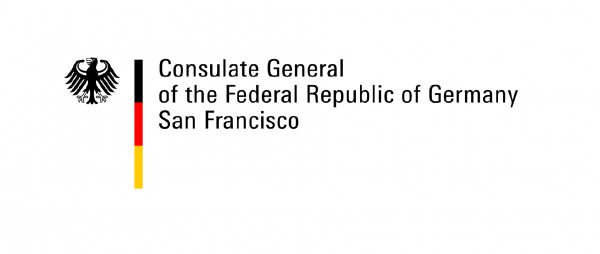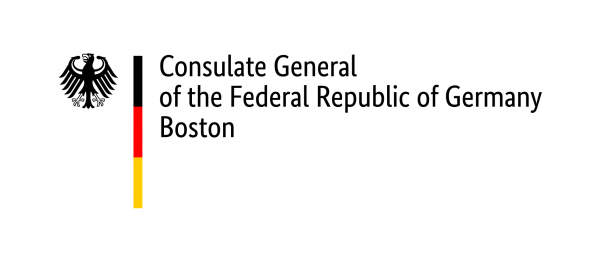COVID-19: Putting Public Health to the Test
Thursday, Dec 16, 2021
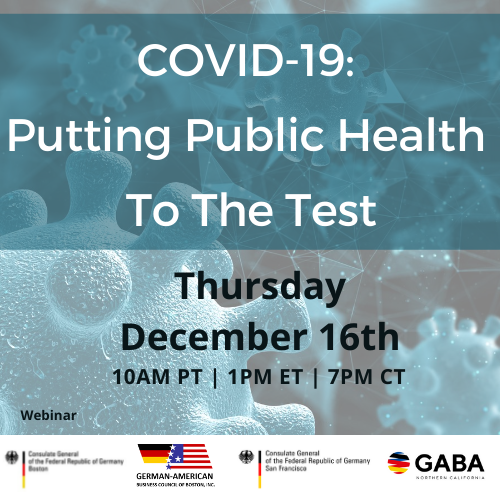
The Continued Role for COVID Testing
A panel discussion with leading health experts
As air and land borders have opened again and families are planning to get together in person this holiday season, we are going to discuss COVID-testing as a public health tool, and one that may be underutilized in this phase of the pandemic. Currently, in the U.S. COVID testing mostly occurs in persons showing symptoms (test-to-treat). Could we navigate in person meetings, the work place, family gatherings more safely if we were to (rapid) test everyone before getting together (test-to-stay)? Some countries around the world were using this path. And many countries are reconsidering their testing strategy again as COVID cases continue to rise, including in Germany where tests are now being offered for free again.
We will discuss this with leading and vocal scientists on this topic here in the U.S. What can the different COVID tests tell us, and what not? Where does the science and development of new tests stand? What is the threat from break-through infections and how could rapid testing add to the primary vaccination strategy? And how can we achieve broad acceptance in the population?
Panelists:
Karl Lauterbach, M.D., Sc.D., Member of the German Government, Professor of Health Economics and Clinical Epidemiology at the University of CologneDue to urgent ministerial commitments, Prof. Lauterbach had to cancel his participation.- Michael Mina, M.D., Ph.D., Chief Science Officer, eMed Digital Healthcare
- Melanie Ott, M.D., Ph.D., Director, Gladstone Institute of Virology, Professor of Medicine at the University of California San Francisco
- Stefanie Friedhoff, Associate Professor of the Practice, Brown University School of Public Health
Moderator
- Jan Hartmann, M.D., President German-American Business Council of Boston, and Chief Medical Officer, Haemonetics Corporation
Welcome by
- Nicole Menzenbach, Consul General of Germany to the New England States in Boston
Format: Virtual Panel Discussion
Platform: Zoom Webinar
Length: One hour
Date: Thursday, December 16th, 10AM PT | 1PM ET | 7PM CET
When registering, you will automatically receive an email with the Zoom webinar link. Please check your Spamfilter in case you don’t see it right away. The Email will come from “Zoom”.

Photo credit: karllauterbach.de
Karl Lauterbach is a professor of Health Economics and Clinical Epidemiology at the University of Cologne (Germany), Member of the Deutsche Bundestag (MdB) and an Adjunct Faculty Member of the Department of Health Policy and Management at the Harvard School of Public Health (Boston). He is one of the leading experts and policy makers for the COVID-19 pandemic in Germany.
He studied Medicine in Aachen and in Dusseldorf (Germany) and in San Antonio (Texas, US) and received his first doctoral degree at the Institute of Nuclear Medicine at the Nuclear Research Centre in Julich (Germany).
He studied health policy and management and epidemiology as a post-doc at the Harvard School of Public Health, Boston, USA, and received a degree as a Master of Public Health and as a Doctor of Science (Sc.D.) in Health Policy and Management. He was a fellow of the Program of Ethics and the Professions at Harvard (1992) and a fellow in Medical Ethics at the Harvard Medical School (1993). Since 2008 Dr. Lauterbach is also an Adjunct Professor of Health Policy and Management at the Department of Health Policy and Management, Harvard University.
Since 2005 he has been a Member of the Deutsche Bundestag for the Social Democratic Party (SPD), most recently reelected in September of 2021. From 2013 to 2020 he was deputy chairman of the Social Democratic parliamentary group.
Dr. Lauterbach is author of more than 100 scientific articles in peer-reviewed international journals in the field of health economics and health policy. His books include standard teaching books for students of health politics and medical students in Germany.
Michael Mina, M.D., Ph.D., Chief Science Officer, eMed
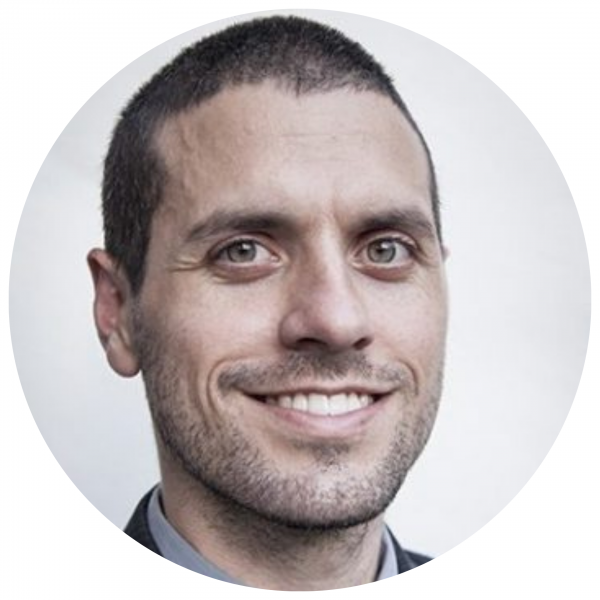 Michael Mina, MD, PhD, is Chief Science Officer at eMed, a leading digital health care company. As Chief Science Officer, Dr. Mina leads eMed’s new Advisory Services group which will enable diagnostic companies to digitize their point of care solutions.
Michael Mina, MD, PhD, is Chief Science Officer at eMed, a leading digital health care company. As Chief Science Officer, Dr. Mina leads eMed’s new Advisory Services group which will enable diagnostic companies to digitize their point of care solutions.
Mina joined eMed from the Harvard T.H. Chan School of Public Health where he was Associate Professor of epidemiology, immunology and infectious diseases and a core member of the School’s Center for Communicable Disease Dynamics (CCDD). He was also associate medical director in clinical microbiology (molecular diagnostics) in the Department of Pathology at Brigham and Women’s Hospital, Harvard Medical School.
He earned his MD and PhD degrees from Emory University, with doctoral work split between CDC, St. Jude Children’s Research Hospital, the Respiratory and Meningeal Pathogens Research Unit in Johannesburg, South Africa, and the Emory Vaccine Center. He completed his postdoctoral work at Princeton University in ecology and evolutionary biology (of infectious disease dynamics) with Prof. Bryan Grenfell and at Harvard Medical School in the Department of Genetics with Prof. Stephen Elledge. He completed his residency training in clinical pathology at Brigham and Women’s Hospital/Harvard Medical School.
Melanie Ott, Director, Gladstone Institute of Virology, Professor, Department of Medicine, University of California San Francisco
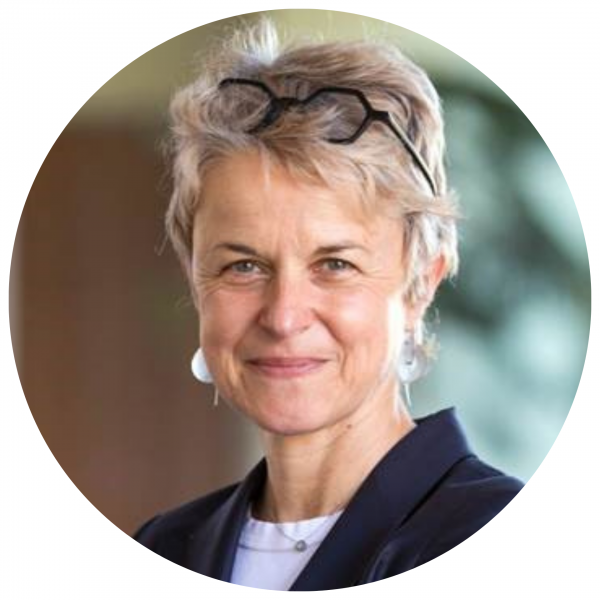 Melanie Ott, M.D., Ph.D. is the director of the Gladstone Institute of Virology and a professor of medicine at the University of California San Francisco. She studied under Nobel laureate Harald zur Hausen in Heidelberg/Germany and has been recognized for her contributions to HIV Cure research and the pathogenesis of hepatitis C and Zika virus infections. Since January 2020, she has pivoted part of her efforts to SARS-CoV-2 research. This work is focused on infectious SARS-CoV-2 and harnessing the host response for new therapeutics. Her lab also develops new rapid diagnostics based on CRISPR and mobile phone technologies. Melanie is currently advising Gladstone and the University of California San Francisco on their COVID responses and was recently named one of the most influential women in the Bay Area by the SF Business Times. She is an elected member of the Association of American Physicians (AAP) and a fellow of the American Academy of Microbiology (AAM).
Melanie Ott, M.D., Ph.D. is the director of the Gladstone Institute of Virology and a professor of medicine at the University of California San Francisco. She studied under Nobel laureate Harald zur Hausen in Heidelberg/Germany and has been recognized for her contributions to HIV Cure research and the pathogenesis of hepatitis C and Zika virus infections. Since January 2020, she has pivoted part of her efforts to SARS-CoV-2 research. This work is focused on infectious SARS-CoV-2 and harnessing the host response for new therapeutics. Her lab also develops new rapid diagnostics based on CRISPR and mobile phone technologies. Melanie is currently advising Gladstone and the University of California San Francisco on their COVID responses and was recently named one of the most influential women in the Bay Area by the SF Business Times. She is an elected member of the Association of American Physicians (AAP) and a fellow of the American Academy of Microbiology (AAM).Stefanie Friedhoff, Associate Professor of the Practice, Brown University School of Public Health
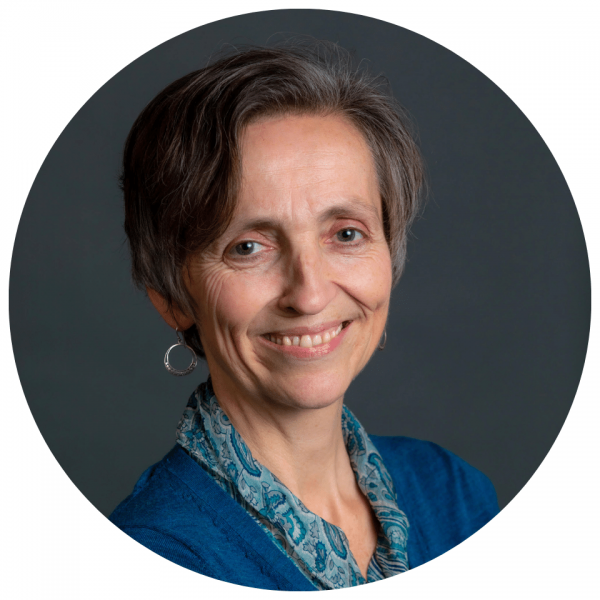 Stefanie Friedhoff is an associate professor of the practice in Health Services, Policy and Practice, and strategy director at the Brown University School of Public Health. Her work investigates intersecting issues of health equity, science, technology, media, culture and trauma.
Stefanie Friedhoff is an associate professor of the practice in Health Services, Policy and Practice, and strategy director at the Brown University School of Public Health. Her work investigates intersecting issues of health equity, science, technology, media, culture and trauma.
At the Brown School of Public Health, she leads the Dean’s crisis communication and pandemic policy response team, including research collaborations, rapid response and data projects; and serves as strategic advisor to the Dean. Friedhoff’s research explores the relationships between the information needs of marginalized communities, misinformation, and health. A veteran journalist, Friedhoff has previously worked as an editor, foreign correspondent and feature writer on three continents. Her work has appeared in Time magazine; The Boston Globe; STAT News; Geo; Sueddeutsche Zeitung; Facts; and many other publications in the U.S. and Europe. Friedhoff is an Expert Contributor at the Covid Collaborative, a co-creator of the Preprint Sifter, and serves on the Boards of the Trust for Trauma Journalism and the science journalism start-up RiffReporter. In 2001, she was awarded a Nieman Fellowship at Harvard University.
Jan Hartmann, M.D., President German-American Business Council of Boston, and Chief Medical Officer, Haemonetics Corporation (Moderator)
 Jan Hartmann, M.D. is Chief Medical Officer at Haemonetics, a global leader in blood management solutions, where he has global responsibility for medical affairs, clinical development, academic partnerships, and medical safety. Previously, Dr. Hartmann spent nearly a decade at McKinsey & Company where he most recently served as Associate Partner in the Global Pharmaceuticals and Medical Device Practice. He received his M.D. from the Albert-Ludwigs-University of Freiburg in Germany. Additionally, Dr. Hartmann was a research scientist in the Department of Cell Biology at Yale University School of Medicine and a scholar of the German Academic Scholarship Foundation (“Studienstiftung”). He has been serving as President of the German-American Business Council of Boston since July 2021.
Jan Hartmann, M.D. is Chief Medical Officer at Haemonetics, a global leader in blood management solutions, where he has global responsibility for medical affairs, clinical development, academic partnerships, and medical safety. Previously, Dr. Hartmann spent nearly a decade at McKinsey & Company where he most recently served as Associate Partner in the Global Pharmaceuticals and Medical Device Practice. He received his M.D. from the Albert-Ludwigs-University of Freiburg in Germany. Additionally, Dr. Hartmann was a research scientist in the Department of Cell Biology at Yale University School of Medicine and a scholar of the German Academic Scholarship Foundation (“Studienstiftung”). He has been serving as President of the German-American Business Council of Boston since July 2021.